- Home
- James Rollins
The Eye of God: A Sigma Force Novel sf-9 Page 21
The Eye of God: A Sigma Force Novel sf-9 Read online
Page 21
Duncan came last, adding, “Holy Mother of—”
Josip cut him off, gaping around. “This cave must have been underwater, too. When the waters receded, seeping slowly away, it left only the sea’s salt behind.”
“And hopefully something else,” Vigor added and pointed across the chamber. “We need to search for more of Genghis’s relics.”
The group spread out, working gingerly across the floor. It was a difficult task as the stone underfoot was piled thickly with the same fingerlike crystals seen outside, only some here were as thick around as a man’s thigh, leaning drunkenly upon one another, like a felled forest of salt.
The crunch of crystals echoed off the walls as they labored. The air smelled of the sea and burned the eyes.
Jada whispered with Duncan, but her voice reached everyone due to the cavern’s acoustics. “Water levels must have risen and fallen in here over the centuries to create this accumulation.”
“And rainfall added to it each year,” Duncan said. “Leaching more salt from the ground above.”
Jada stared up to the roof. “I’m guessing during Genghis’s time this cavern was not entirely flooded. But only accessible by swimming underwater.”
They were probably right.
Suddenly tired, recognizing that perhaps archaeology was a young man’s sport, Vigor leaned on a salt column as wide as a telephone pole to rest, believing it sturdy enough to hold his weight. Instead, it cracked under his hand, breaking in half, proving its fragility.
Luckily Monk and Rachel were there to pull him back and shield his body as a shower of crystal shards and larger chunks rained down.
“Take care, Uncle,” Rachel warned, helping him straighten and brushing sparkling dust from his shoulders.
“Look here,” Monk said, pointing to the flared base of the broken column.
Vigor turned, bringing up his flashlight. He shone its brightness into the core of the translucent pillar. Something buried there reflected his light even brighter.
“Over here!” he called to the group.
Others gathered and added their own beams, helping to reveal what was preserved in the salt.
Josip dropped to one knee. “It appears to be a pedestal of stone, holding up a box of some sort.”
His friend stared up at him, wonder shining in his face.
“Like the Hungarian bishop described in Attila’s tomb!” Vigor exclaimed. “This must be it.”
Josip stood. “We must break it free of the salt!”
Arslan appeared, bringing up a small satchel of tools. Using hammers, chisels, and brushes, Josip worked with Arslan to chip away at the thick base of the column.
As it was slowly revealed, the box proved to be large, a foot or so tall and twice as long.
Josip swept crystals off its black surface. The chisel had nicked it in a few places. Vigor’s friend used a fingernail to dig more vigorously at one of the scratches. “It looks to be silver under the tarnish.”
Vigor leaned closer as Arslan freed the lower half of the chest. “I think you’re right. And it’s hinged at the back here.”
In short order, the remainder of the box was broken free of the crust. It shifted on its pedestal with a final strike of a hammer.
Arslan stepped back, his work done.
Vigor waved to Josip. “You open it. You’ve earned the right.”
His friend gripped his arm in gratitude, speechless with anticipation, his fingers shaking slightly on Vigor’s arm.
With both hands, Josip lifted the lid and cracked it open with a salty grate of its hinges. As he raised it, the front panel fell open, apparently hinged on its bottom edge.
Rachel stepped away, covering her mouth. “My God . . .”
11:02 P.M.
As Vigor’s niece moved back, Duncan had a clear view of what the box held.
It looked like a miniature sculpture of a boat, with a prominent keel that swooped into a knobbed bowsprit at the front, its sides made of artfully curved planks. A pair of masts supported square sails, both slightly ribbed like a closed set of blinds.
“Looks like a Song dynasty junk,” Vigor said. “During the Middle Ages such ships plied the seas and rivers of China.”
Rachel shook her head. “But this one is constructed out of rib bones and vertebrae. The sails are made of dried human skin.”
Duncan stepped closer and saw she was right. The curved planks of the boat’s side were ribs. The knob of the bowsprit was a spinal vertebra. He would take her word that the sails were made of human skin.
“More of Genghis,” Monk said.
“Can we be sure?” Rachel asked.
“I can send a sample to the same genetics lab in Rome,” Vigor offered. “We could have confirmation in a day or so.”
Jada nudged Duncan and stated, “Or we find out right now.”
All eyes turned to him.
He understood. “She’s right.” He lifted his hands and wiggled his fingers. “If this tissue is from the same body, I’ll know.”
The others cleared out of his way. Stepping forward, he reached out and moved his fingertips to the curved sides of the boat. Immediately he registered the same pressure, the same unique energy field as in the earlier relics. He swore now he could almost sense the color of the field. It was a term people like him used to describe the minute variations of electrical fields that defied adequate description.
Like trying to describe blue to a blind person.
Only, in this case, if he had to pick a color for this field, it would be black.
He stepped away and shook the tingle from his fingertips, shivering all over for a breath.
“Definitely the same,” he concluded.
Before anyone could comment, a piercing screech made them all jump. Sanjar’s falcon flew effortlessly through the tunnel and swept high into the room. Sanjar lifted his arm and the bird dove to a fluttering landing, panting through its open beak.
“Storm must be here,” Sanjar said, brushing dust from the falcon’s feathers. “We should be going.”
Another squawk erupted. This time it was from the team’s radio. Monk spoke with the pilot and got confirmation.
“He says we must get going now.” Monk pointed Duncan toward the box. “Close that up and let’s get moving.”
With Josip’s and Vigor’s help, Duncan secured the tarnished chest and hauled it up. It was damned heavy. If it was indeed silver, it was likely worth a small fortune.
Monk assisted him in getting the chest through the tunnel. Once back outside, Duncan understood the falcon’s sudden desire to rejoin its master. The starry night of earlier was gone. Black clouds roiled overhead. Sand blasted against the cliff. To the west, conditions looked even worse.
The group hurried across the flatlands, following their crushed path back. They all shuttled sideways, putting their backs to the wind. Visibility was crap. Duncan carried the box under one arm and had a hold of Jada’s hand in the other. Ahead of him, Monk and Rachel helped Vigor, while Sanjar and Arslan supported Josip.
Finally they circled to the far side of the hill, out of direct assault by the storm. The pilot spotted them. He hopped out, opened the side door to the helicopter, and waved them to hurry.
Not that any of them needed the encouragement.
As a group, they ran for the shelter of the chopper’s cabin and clambered inside. Even before they had strapped in, the pilot had the bird lifting off.
Once the wheels were off the ground, the helicopter swung around and flew low across the salt flats, keeping to the shelter of the tall hill for as long as possible, putting as much distance as possible between them and the storm.
Everyone found seats, and harnesses clicked into place.
Finally, the helicopter shot higher, buffeted by the storm’s leading edge, and fled under full power. The bouncing and rattling jarred teeth and challenged the strength of their seat belts.
For a few more long minutes, no one spoke, and hardly anyone breathed.
“Should be smooth sailing from here,” the pilot said, though his voice had a shaky edge that suggested their escape was closer than Duncan cared to think about.
They rushed through the night, the stars shining overhead again.
Duncan finally let out a long shuddering breath. “Well, that was fun.”
Jada looked at him aghast.
11:33 P.M.
As they flew back toward their base of operations, Vigor studied the tarnished silver box. It rested on the seat next to Duncan, who kept a palm atop it.
Vigor pictured what it held, but he wasn’t the only one wondering.
“There must be a clue contained within that boat,” Josip said. “Some indication where we must go next.”
Vigor pictured the eye sewn shut on the cover of the book—and the secrets it had hidden. “You are probably right. Once at your library, we’ll see what we can discover.”
Josip must have noted the lack of enthusiasm in his voice. “What’s wrong?”
He waved a hand dismissively. “Just tired,” he lied.
“I wonder how many more caches of Genghis’s relics are out there,” Josip said. “Into how many pieces had the great khan been divvied?”
Vigor shifted in his seat, surprised that Josip was so dense. “There is only one more spot to go.”
Josip frowned at him. “How do you know—?”
Then understanding dawned in his eyes. He patted Vigor on the knee. “Your body may be tired, my friend, but not your mind.”
Monk stirred across the way, having eavesdropped on the conversation. “How about you explaining it to those who are tired in both body and mind?”
Vigor smiled with warm affection at him. “The box we found is silver.” He nodded to the chest at Duncan’s side. “But according to the Hungarian bishop’s account, the box at Attila’s tomb was iron.”
Josip sat straighter, thrilled. “Which means the final box, the one holding the greatest treasure of this hunt, will be gold.”
Monk got it. “Like the three original boxes of St. Thomas’s reliquary. Iron, silver, gold.”
Vigor nodded. “We are one step away from the lost tomb of Genghis Khan.”
Duncan patted the box with his palm. “That is, if you can solve the riddle of that boat made of bone.”
Vigor sighed, praying that God would keep him strong enough for this challenge.
If only for a little longer . . .
The pilot reported good news. “We’re back to where we started, folks. But we may need to batten down the hatches for the night. The weather coming is not going to be fit for man or beast.”
Vigor looked out toward the storm on the horizon. It seemed that the black blizzard hadn’t given up its chase and bore down on them with all its fury.
Knowing what was coming, the helicopter dropped quickly toward the rusted bulk of the ship, seeking its shelter. The giant vessel had clearly weathered such gales in the past and would do so again.
Vigor settled back, relieved.
Once we get underground, we should be safe.
16
November 19, 2:44 A.M. KST
Off the coast of South Korea
Seichan stood at the rail of the USS Benfold, a United States guided missile destroyer. She wore a borrowed parka, its fur-edged hood tossed back. She could not stand the confinement below any longer, with its cramped hallways, the press of bodies, the windowless chambers all painted the same drab colors.
She needed air, so she climbed topside.
The night was bitterly cold, the stars hard as diamonds; even the comet looked like a lump of ice dragged across the sky.
The ship cruised south through the territorial waters of South Korea. So far no alarm had been raised by Pyongyang. Likely those in power up north were too embarrassed to admit their failure. Still, it had been a very close call. Gray was with the medics getting properly attended.
She flashed back to firing her pistol, acting on instinct, blind to anything but survival. She had only meant to knock the rider off his bike. Still . . .
I almost killed him.
A deck hatch clanged open behind her. She closed her eyes, not wanting any intrusion. Footsteps approached, and a form stepped to the rail next to her. She smelled jasmine. The scent threatened to cast her deeper into the past if she let it. Even now, an image of a flowering vine in sunlight appeared in her mind’s eye, with purple flowers, the bobble of fat-bellied bees.
She pushed it down.
“Chi,” her mother said, using her old name, a single note from the lips that carried too much weight for that short exhalation of breath.
“I prefer Seichan,” she said, opening her eyes. “I’ve been that far longer than the other.”
Small hands gripped the rail beside hers, not touching hers, yet close enough for Seichan to feel the warmth from them on this cold night. Still, the distance between them remained a vast gulf.
Seichan had imagined this reunion a thousand ways, but none of them as such profound strangers. She had studied her mother’s features during the trip back here. She could touch and point to those that were achingly familiar: the arch of an eyebrow, the curve of her lower lip, the shape of her eyes. But at the same time, it was the face of a stranger. Not because of the purplish scar or the tattoo, but something deeper.
When last she looked upon her mother, she had been a child of nine. She looked upon her now as a woman two decades older. She was not that child any longer. Her mother was not that young woman.
“I must leave soon,” her mother warned.
Seichan took a deep breath, testing how that made her feel. Tears threatened—but only because she felt nothing at those words, and it devastated her.
“I have obligations,” her mother explained. “Men and women who are still in jeopardy and need my help. I cannot abandon them.”
Seichan held back a bitter laugh at the irony of those words.
Her mother must have still sensed it.
“I looked for you,” she said softly after a long pause.
“I know.” Seichan had heard the same from Gray.
“They told me you were dead, yet still I searched until it hurt too much to do so anymore.”
Seichan stared down at her own hands, surprised to find them so white knuckled as they gripped the rail.
“Come with me now,” her mother asked.
Seichan remained silent for too long.
“You can’t, can you?” her mother whispered.
“I also have obligations.”
Another silence stretched, filled with far more import than their words.
“I heard he is leaving again. So you will go with him?”
Seichan didn’t bother answering.
They stood together for a long time, both with so much to say, and so little to talk about. What else could they do? Compare scars, swap tales of horror and bloodshed, of what one did to survive? In the end, they said nothing.
Finally, her mother unclasped her hands and faded back, turning away, leaving only a whisper behind. “Have I lost you forever, my little Chi? Did I never really find you again?”
And then she was gone, leaving behind only the scent of jasmine.
3:14 A.M.
Gray leaned against the conference table, too tired to trust his legs. He and Kowalski had the officers’ wardroom all to themselves, courtesy of the ship’s captain. The crew had brewed coffee and laid out a spread of scrambled eggs and bacon.
It wasn’t every day a couple of U.S. operatives escaped North Korea.
With his wounded shoulder scrubbed, sprayed with a liquid bandage, and wrapped, he felt worlds better. The muddy coffee certainly helped, too.
Kowalski sat in a neighboring chair, his feet propped up on the table, a plate of bacon resting on his stomach. He yawned with a jaw-cracking pop.
The large LCD monitor before Gray finally flickered to life. The
feed was being dispatched through high-security channels to this private room. He found himself staring into the communications nest at Sigma command in D.C.
The director faced him, with Kat seated to the side, tapping furiously at a computer console. She had set up this private videoconference call.
Painter nodded to him. “Commander Pierce, how are you holding up?”
“I’ve had better days.”
And worse.
Despite all that had happened, they had succeeded in rescuing Seichan and made it out alive with their skin intact—okay, not entirely intact, but close enough.
“I know you’ve been through hell and back,” Painter said, “but we need you up and running for another mission, if you’re able.”
“In Mongolia,” Gray said.
He had already debriefed with Kat and was relatively up to speed in regard to events surrounding the crashed satellite.
“I need an honest assessment,” Painter said. “Are you and Kowalski fit enough to continue?”
Gray glanced over at Kowalski, who merely shrugged and picked up another slice of bacon.
“I think fit enough pretty much describes us,” Gray answered. “But a little more sleep en route, and we’ll be even better.”
“Good, then I wanted to show you this.” Painter turned to Kat.
She shifted into view, still tapping at the keyboard with one hand while staring at him. “I’m going to patch you in with Lieutenant Josh Leblang, out of McMurdo Station.”
“In Antarctica?”
“That’s correct. He’s with a recon crew about a hundred klicks out from the base, on the Ross Ice Shelf.” Kat punched a few more keys and spoke into a microphone by her chair. “Lieutenant Leblang, can you show us again what you found? Walk us through what you saw?”
A sputtering response reached Gray that sounded vaguely affirmative.
Then the screen cleared and was replaced with the face of a young man in a military parka. He had his hood thrown back, apparently enjoying the bright morning of an Antarctic summer. He wore a woolen cap over his short dark hair, his cheeks reddened from the cold, or maybe flushed from excitement.

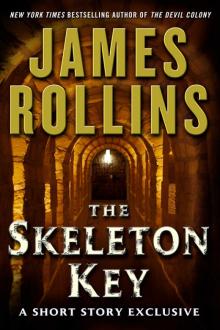 The Skeleton Key
The Skeleton Key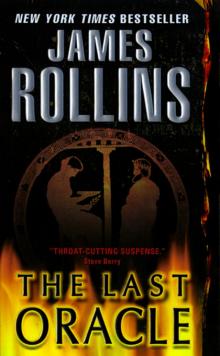 The Last Oracle
The Last Oracle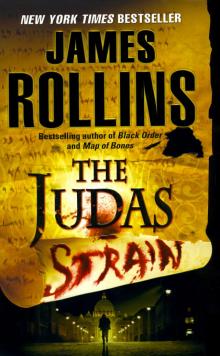 The Judas Strain
The Judas Strain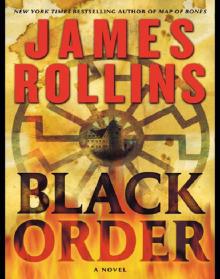 Black Order
Black Order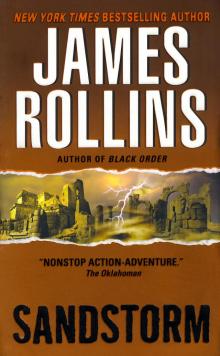 Sandstorm
Sandstorm Ghost Ship
Ghost Ship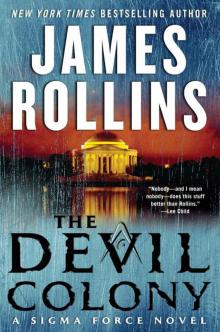 The Devil Colony
The Devil Colony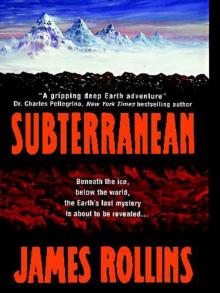 Subterranean
Subterranean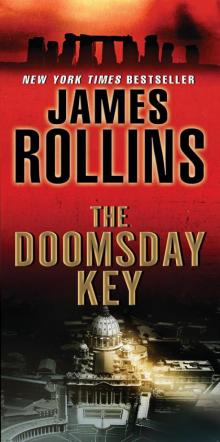 The Doomsday Key
The Doomsday Key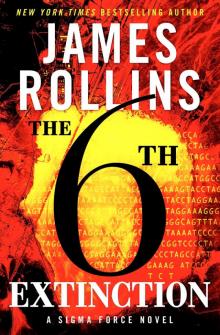 The 6th Extinction
The 6th Extinction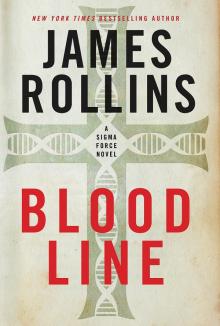 Bloodline
Bloodline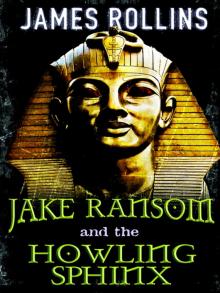 Jake Ransom and the Howling Sphinx
Jake Ransom and the Howling Sphinx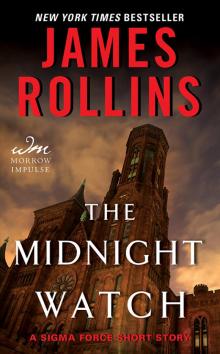 The Midnight Watch
The Midnight Watch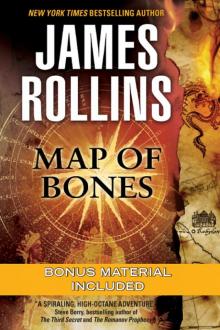 Map of Bones
Map of Bones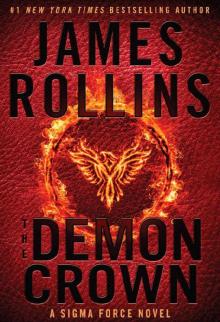 The Demon Crown
The Demon Crown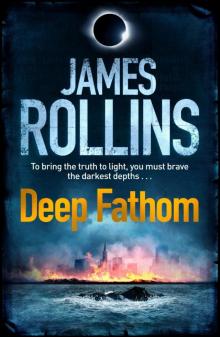 Deep Fathom
Deep Fathom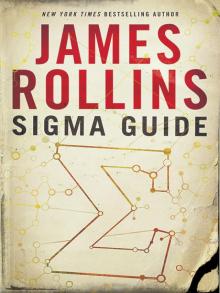 Sigma Guide
Sigma Guide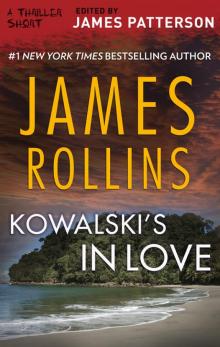 Kowalski's in Love
Kowalski's in Love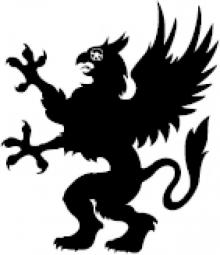 Jake Ransom and the Skull King's Shadow
Jake Ransom and the Skull King's Shadow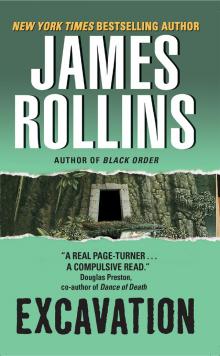 Excavation
Excavation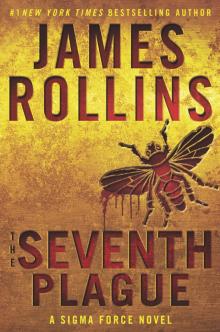 The Seventh Plague
The Seventh Plague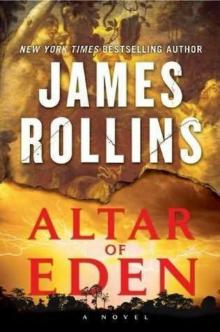 Altar of Eden
Altar of Eden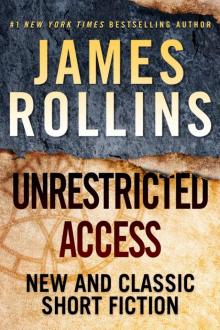 Unrestricted Access: New and Classic Short Fiction
Unrestricted Access: New and Classic Short Fiction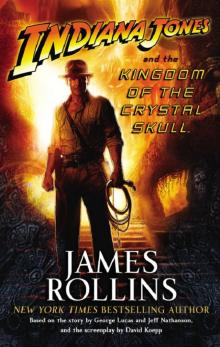 Indiana Jones and the Kingdom of the Crystal Skull
Indiana Jones and the Kingdom of the Crystal Skull Crucible
Crucible The Eye of God
The Eye of God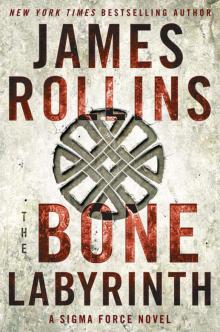 The Bone Labyrinth
The Bone Labyrinth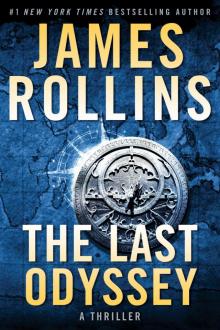 The Last Odyssey: A Thriller
The Last Odyssey: A Thriller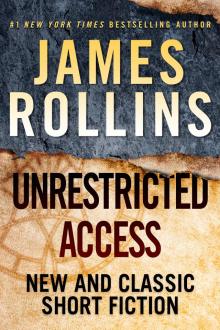 Unrestricted Access
Unrestricted Access Amazonia
Amazonia Blood Brothers: A Short Story Exclusive
Blood Brothers: A Short Story Exclusive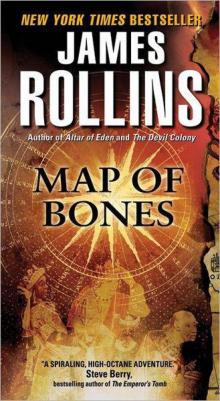 Map of Bones: A Sigma Force Novel
Map of Bones: A Sigma Force Novel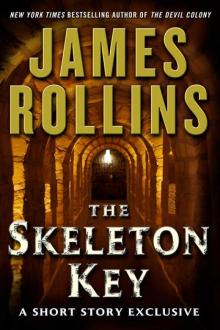 The Skeleton Key (sigma force)
The Skeleton Key (sigma force)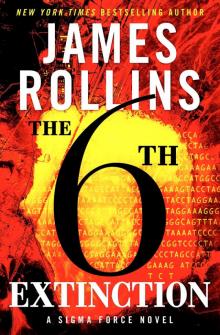 Sigma Force 10 - The Sixth Extinction
Sigma Force 10 - The Sixth Extinction Innocent Blood
Innocent Blood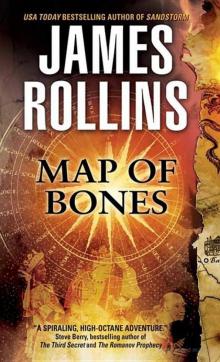 Map of Bones sf-2
Map of Bones sf-2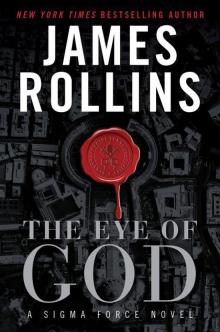 The Eye of God: A Sigma Force Novel
The Eye of God: A Sigma Force Novel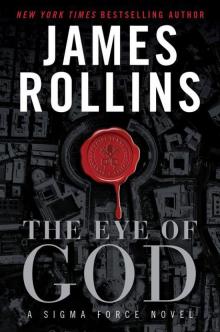 The Eye of God: A Sigma Force Novel sf-9
The Eye of God: A Sigma Force Novel sf-9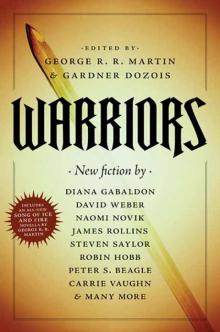 The Pit
The Pit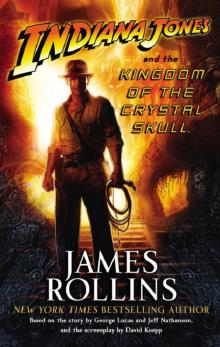 Indiana Jones and the The Kingdom Of The Crystal Skull
Indiana Jones and the The Kingdom Of The Crystal Skull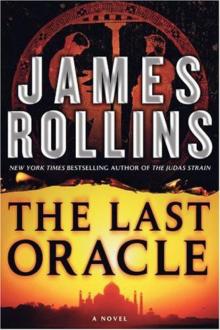 The Last Oracle (2008) sf-5
The Last Oracle (2008) sf-5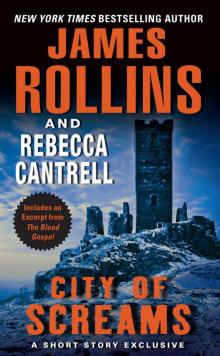 City of Screams
City of Screams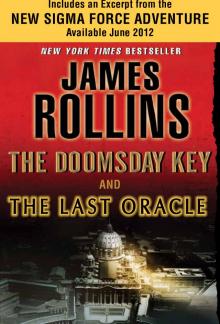 The Doomsday Key and The Last Oracle with Bonus Excerpts
The Doomsday Key and The Last Oracle with Bonus Excerpts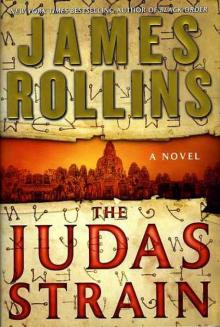 The Judas Strain sf-4
The Judas Strain sf-4 Blood Infernal
Blood Infernal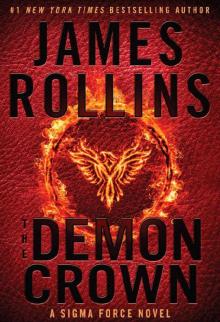 The Demon Crown: A Sigma Force Novel
The Demon Crown: A Sigma Force Novel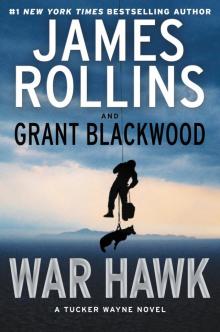 War Hawk: A Tucker Wayne Novel
War Hawk: A Tucker Wayne Novel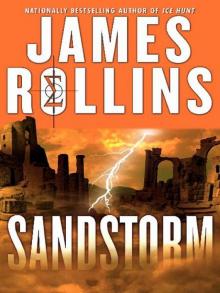 SANDSTORM sf-1
SANDSTORM sf-1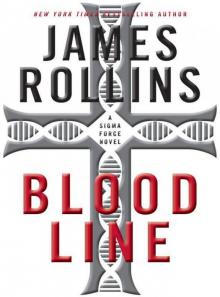 Bloodline: A Sigma Force Novel
Bloodline: A Sigma Force Novel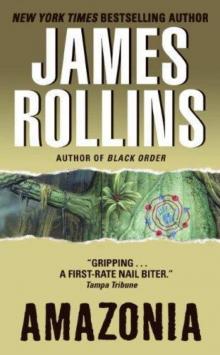 Amazonia: a novel
Amazonia: a novel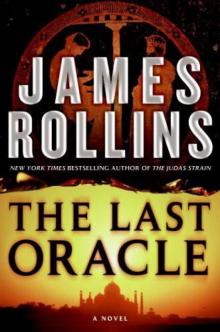 The Last Oracle: A Sigma Force Novel
The Last Oracle: A Sigma Force Novel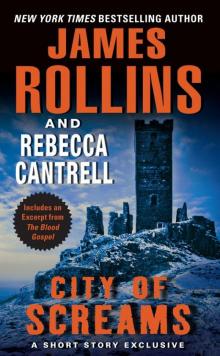 City of Screams (the order of the sanguines)
City of Screams (the order of the sanguines)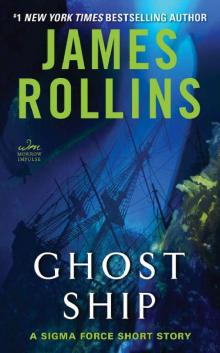 Ghost Ship: A Sigma Force Short Story
Ghost Ship: A Sigma Force Short Story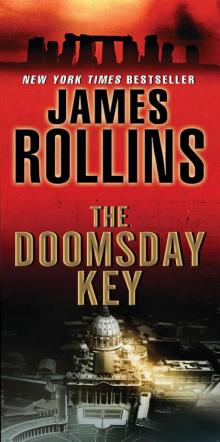 The Doomsday Key: A Sigma Force Novel
The Doomsday Key: A Sigma Force Novel